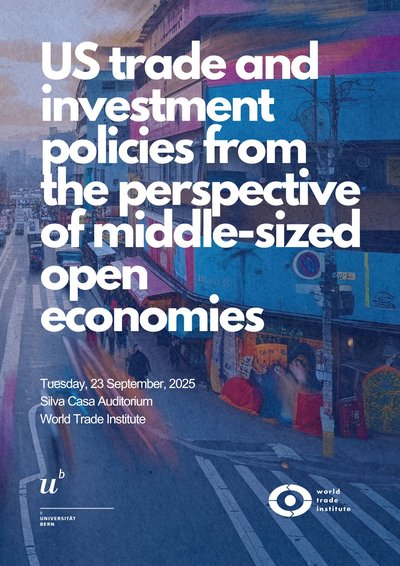Other
23 Sep 2025
,
09:00
-
11:00
| Download
Calendar Event (ICS)
Silva Casa Auditorium, World Trade Institute,
Hallerstrasse 6, Bern, Switzerland
US trade and investment policies from the perspective of middle-sized open economies
This event brings together scholars and practitioners working in the field of trade and investment speaking about experiences ranging from Switzerland, Australia, Malaysia, Singapore to Taiwan, all middle-sized largely open economies.
Speakers:
Kristy Hsu, Chung-Hua Institution for Economic Research
Philippe Lionnet, Swiss State Secretariat for Economic Affairs
Markus Wagner, University of Wollongong
Sufian Jusoh, Director and Professor of International Trade and Investment at the Institute of Malaysian and International Studies (IKMAS), Universiti Kebangsaan Malaysia, as well as the Chair for the ASEAN Integration Grand Challenge at the university
Kirthana Ganeson, WTI
Chair: Manfred Elsig, WTI
The US trade policy has taken a protectionist turn in recent years. With the incoming second Trump
Administration this has further accentuated. The measures taken since the beginning of 2025 are unilateral in
nature pushed by threats of high tariffs on imports. What stands out are the objectives to incentivize reindustrialization
while generating a stream of revenues through tariffs. Since April, many countries have been
in talks with the US Administration to find a provisional outcome to lower tariffs. In return, the Administration
has invited pledges by trading partners in forms of additional purchases of US goods and investments. What
has also characterized the approach are sudden changes communicated by social media posts by the
President which have further infused unpredictability and widespread frustration among allies. Overall,
classical trade policy approaches are put to the test.
Against this background, the round table brings together scholars and practitioners working in the field of
trade and investment speaking about experiences ranging from Switzerland, Australia, Singapore to Taiwan,
all middle-sized largely open economies. We focus on the following.
First, we explore what explains different treatment? How much are different countries affected by tariff hikes,
what sectors are particularly exposed,
Second, we focus on both government and business reactions. How have countries diplomatically engaged
with the US Administration, what types of investment pledges do we see? Are there similarities and
dissimilarities, any lessons learned, in dealing with the US demands. What has been the reaction of the private
sector?
Third, we discuss intermediate and long-term effects. How can this change the countries’ relationships with
the US generally, how does it affect existing alliances, what new avenues are governments exploring from a
risk and resilience perspective? What role, if any, has the World Trade Organization?


